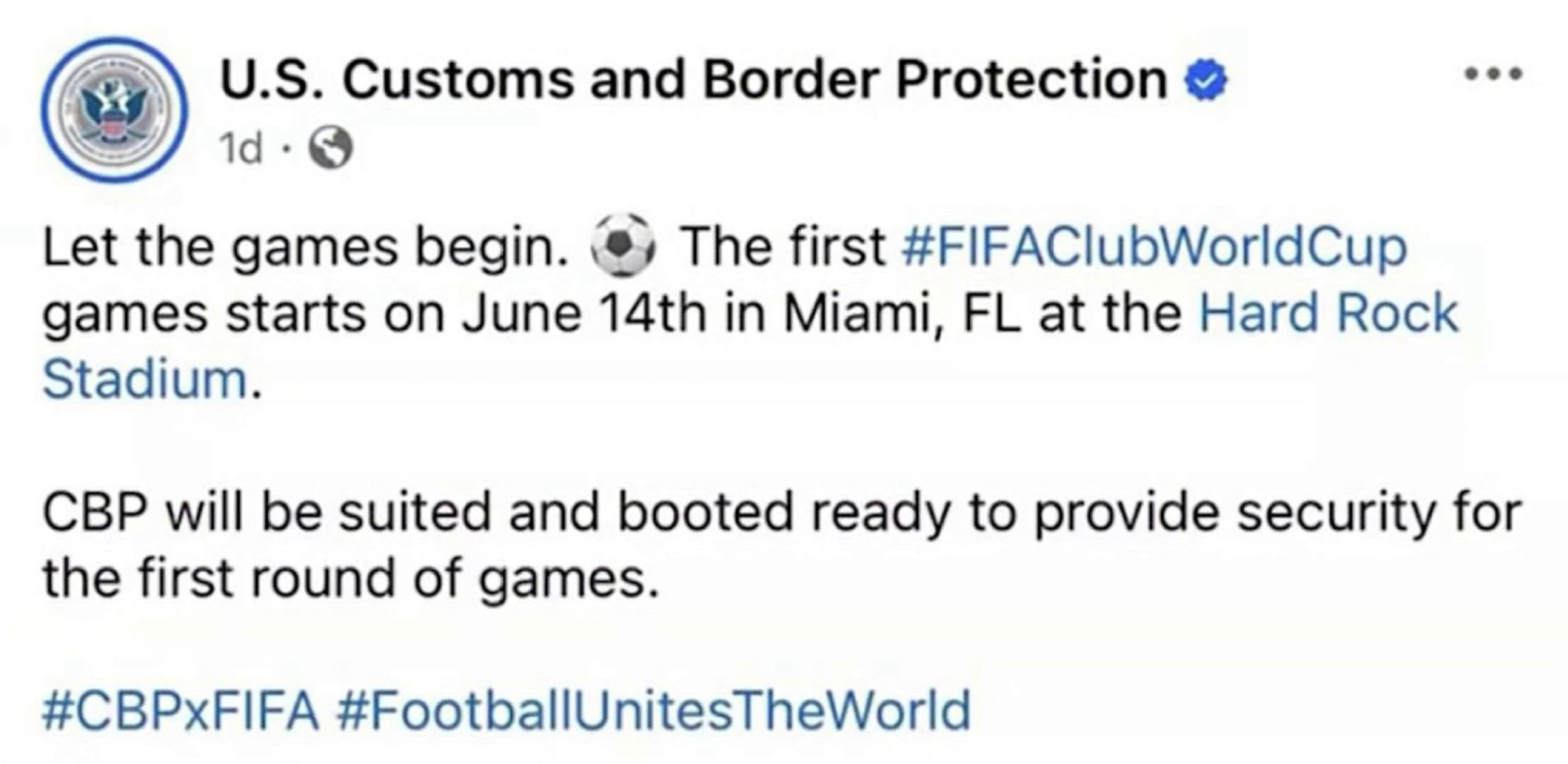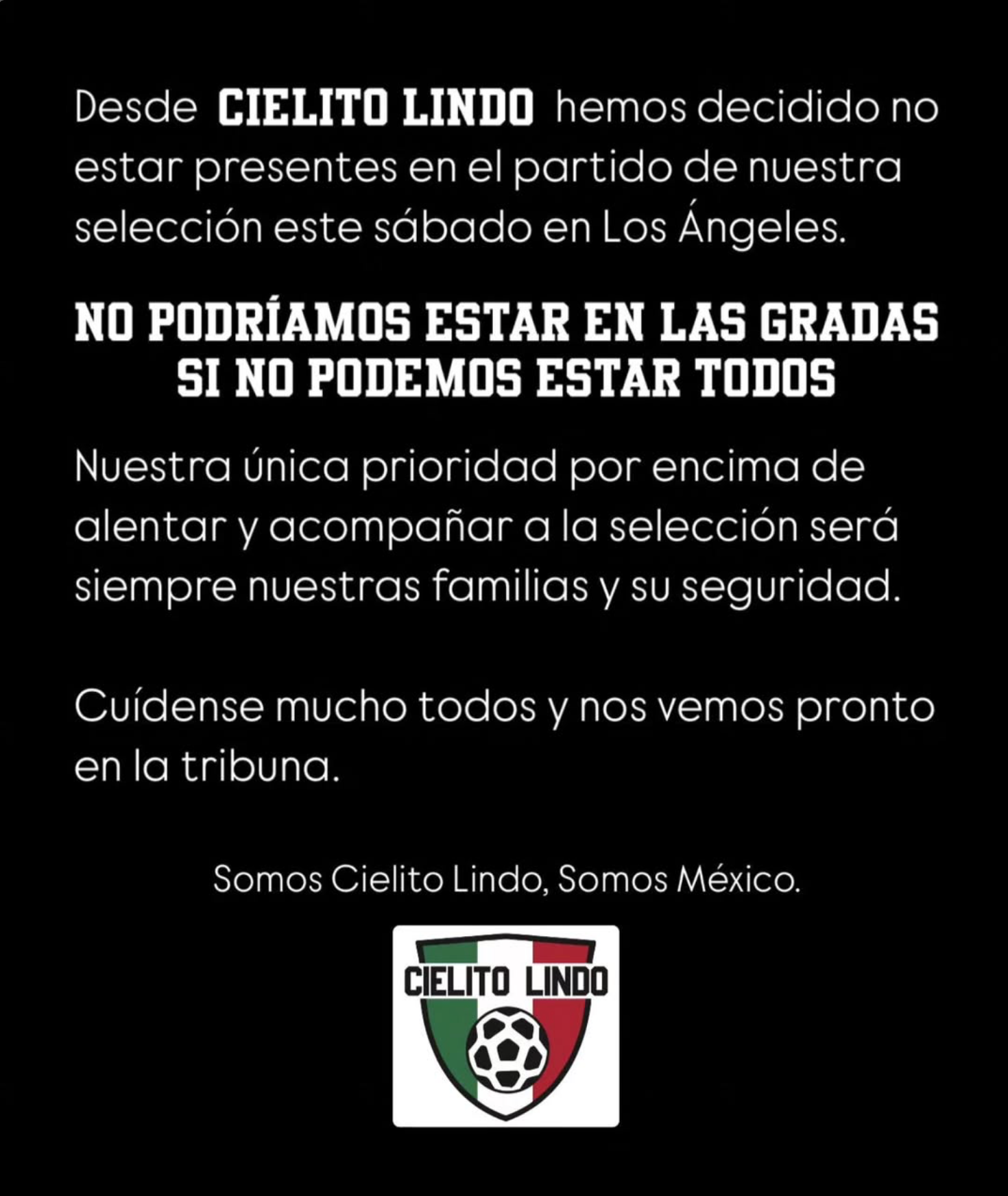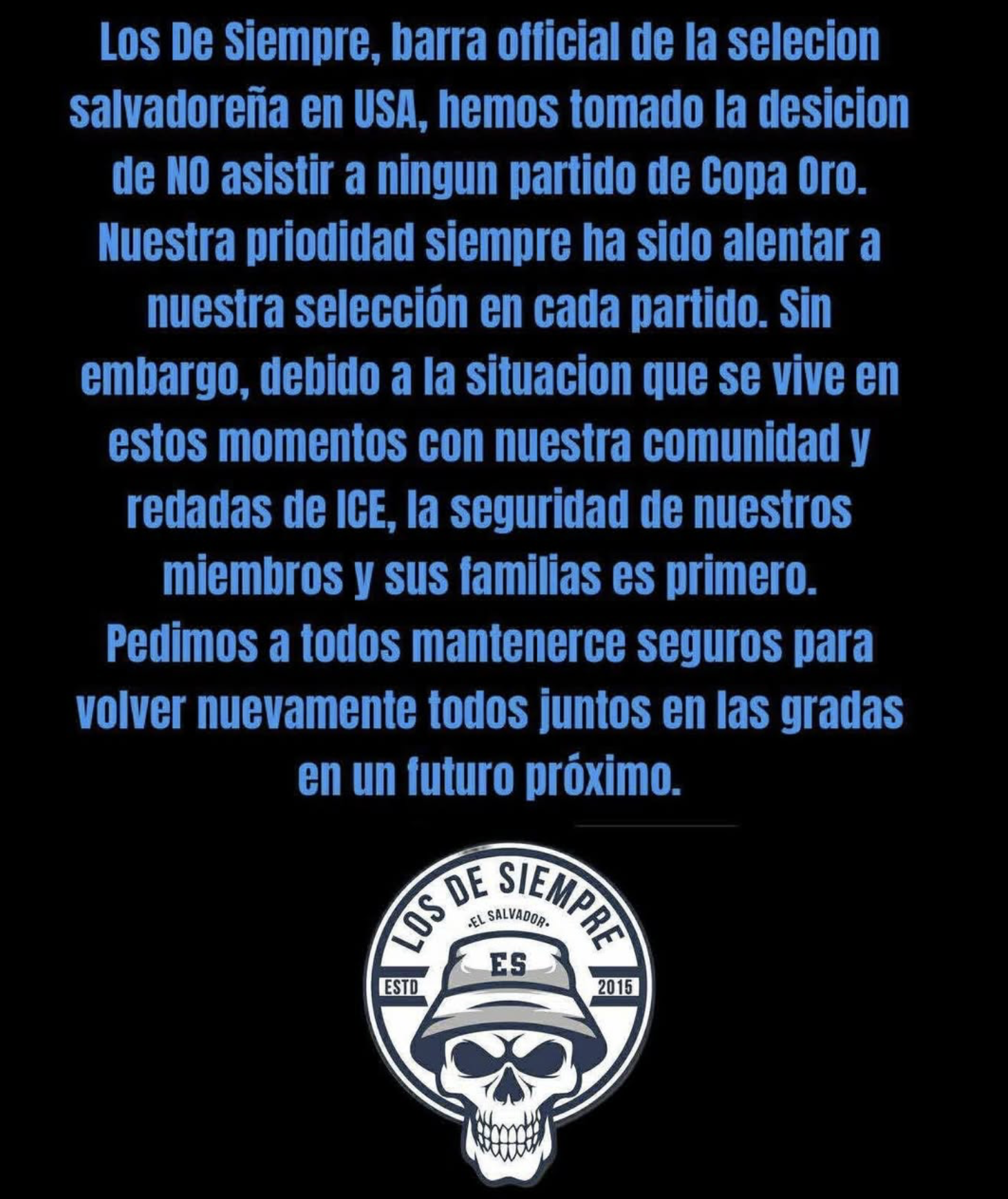Empty stadiums, travel bans, and ICE raids
"If you want to come to the U.S. games, just know that they may harass you depending where you're from and depending on what you look like"

Over the past three weeks, two major soccer tournaments that should have marked a triumphant milestone for LA's megaevent era were overshadowed by the chilling effects of the Trump administration's increasingly authoritarian advances. SoFi Stadium hosted the opener of the CONCANAF Gold Cup on June 14, while FIFA's Club World Cup kicked off in LA on June 15 with six games played at the Rose Bowl. And amid reports of terrified fans and low ticket sales, both tournaments, as well as the geopolitical uncertainties swirling around them, are being closely examined as a test case for next summer, when LA, along with 10 additional U.S. cities, hosts FIFA's 2026 World Cup.
The Club World Cup and Gold Cup finals are still being played, but with all the LA-based matches now complete, I wanted to talk with Tupac Zapata Dubon, an independent broadcast journalist who's been reporting for many international outlets on what's been happening both inside and outside the stadiums. As he travels from protest to raid to kickoff, Tupac is tracking how local immigrant communities are being impacted while seeing firsthand how the U.S.'s policies are being interpreted by global soccer fans. We caught up before he heads to Santa Clara to cover tomorrow's Honduras-Mexico Gold Cup semi-final.
Torched: You’ve described the Club World Cup as a “dress rehearsal” for the World Cup. Why is it important?
Tupac Zapata Dubon: The Club World Cup is a newer FIFA invention. They were held in Brazil for the first few years when the European teams would go on vacation there. The tournament is normally only 16 teams that play, but FIFA made it into 32 teams for the U.S. It is definitely a dress rehearsal for next year.
But it’s also about what the Rose Bowl means to the World Cup. The Rose Bowl was the site of the 1994 World Cup, the most successful World Cup to date. It’s something that FIFA is salivating to recreate. And I hope they do, as a football fan. But they have to figure some things out. You have teams like Iran, for example, that have just qualified to be in the World Cup. What's going to happen to that team now? What’s going to happen to their fans? Are they going to be allowed to come?
Right, especially if they expand the travel ban, that seems like an untenable situation for next summer. And right as this tournament began we had this dramatic announcement from Miami, where CBP put out this later-deleted tweet, “we’ll be suited and booted,” at these first-round games. Were you talking to people at these games that were worried ICE would be there?
Well, ICE was in Pasadena during these games. They were nearby. They were not that far away. But no, they weren't at the stadium. I know that FIFA’s president, Gianni Infantino, is really good friends with Trump. But I don't expect them to conduct raids at the stadium because that's a bad look.

Maybe that's why they deleted the tweet. But did you know fans who were concerned about it? There was an immigration lawyer warning people not to go to the Gold Cup game at SoFi if they were concerned about their status. Did you hear threats specifically about SoFi?
I think a lot of the worries there were about facial recognition tickets. Their whole system is a little bit more sophisticated than the Rose Bowl. Does everyone go into a database? You're going to have teams like Mexico that sell out arenas everywhere they play in the U.S. Are you going to put like 60,000 or 80,000 people into that database?
The week before the Club World Cup started, the same day the travel ban is announced, FIFA makes this announcement saying, we're slashing prices at all the stadiums across the country. Did the stadiums feel empty?
At the Rose Bowl, you could buy a ticket for $20 and then you could easily move to the nice section — where it was also empty. Tickets that normally would cost you around $100. That part was good for fans.
There were a few exceptions, like the Paris Saint-Germain vs. Atlético Madrid game, which was that first day at noon. That did draw 80,000. But that’s two top European teams. After that, it's been no more than 30,000 fans. But overall, the Rose Bowl is a great venue — as long as it’s a later time.
You mean like not at noon.
Some of the times they've scheduled the games because of broadcasting rights have not been ideal. Playing a game at noon at the Rose Bowl is kind of rough. There’s very little shade.
What about the other concerns that fans reported from the Club World Cup games? There were people who were complaining about the policies being different about bringing in and buying water. Parking was unpredictable compared to other sports. It was very overcrowded in some of the common areas. People were saying they were passing out. Did you feel like it was poorly run? Or maybe it was really just that first game?
I did hear about people having trouble buying water. But the parking lot is just a nightmare scenario. Parking in a bunch of grass and dirt.
A golf course.
Yes, a golf course. It’s just not very organized. Personally, I like to find street parking and then I just walk in. I have a spot.
I won’t make you blow up your location. But there were stories about how it was taking so long for people to get in, that they missed the beginning.
That's probably only the first game. For other games, there were usually only 20,000 people, so it was easier. And some of the other games were in the evening, so not as hot.
I guess they’re playing at noon for broadcast reasons, like you said, but it seems like at a certain point, you just have to say okay, for the health and safety of the fans and the players, we actually can't have it at noon. Especially if it's further in the summer. And then I asked a lot of people too, if they knew about the Metro shuttles from Memorial Park. And people said they didn't know anything about it. (Although it was nothing like the situation in Miami.) Not good for our car-free games.
It was nice to see so many people taking the transit. But, you know, it's an experimental tournament. Do I think FIFA is going to repeat it? Probably not. I don't think it's been a financial success. You have stadiums not even a quarter filled at kickoff.
What about the numbers for the Gold Cup? Many fan groups boycotted the LA matches, and protested outside SoFi.
On Saturday, June 14 was the No Kings march and also the start of the Gold Cup at SoFi. There were rumors that ICE was going to be there at the stadium. I think it totally affected the game. Mexico normally sells out arenas. I think they were about 15,000 below. Normally, it doesn't matter who Mexico plays. They can play a high school team. Mexico will sell out SoFi. So there were definitely fears. People were scared.


Statements from fan groups boycotting the Gold Cup: "We wouldn't be in the stands if we can't all be there"
I mean, the Mexico team actually moved hotels. I guess they were downtown, and these stories were making it seem like it was dangerous because rioters were, like, coming to their hotel and putting them in danger. They weren't in danger from the protesters, obviously.
There will always be some that want to sensationalize. But when the people from Honduran media ask me what I think, I say yes, absolutely, all of this is affecting these tournaments. There was a Gold Cup game played in San Jose where the stadium fits 20,000 and there were maybe 6,000, 7,000 fans. It was empty. But there are other venues, for example in Houston, when they do have large Latino populations, where they do sell out. Or in Miami, for example.
And in Miami, the city did a lot of promotion around their Club World Cup events outside of the stadium. I didn't see many here but there were some hospitality houses, like the Paris Saint-Germain pop-up on Melrose. So there is some add-on tourism spending happening.
When I went to the Botafogo game, which is a team from Rio de Janeiro, there were a lot of people who made the trek from Brazil. The Brazilian fans were just ecstatic. They were jubilant because not only did they get to play the best team in Europe, but they beat them. And that was very fun, to be in a South American-style crowd so connected with their team. I look forward to those scenes repeating next year at the World Cup. And I think that's why the World Cup will be very successful. This is a country of immigrants, and you have people from every single country on earth. That’s what I report on.
Let’s talk about that. You’re trying to cover the protests and also cover these games, going back and forth. Sometimes in the same day. And you’re also going to investigate where raids had happened and talking to people who were affected. Can you talk about that whiplash — as you're going from this amazing celebration of immigrant culture in one part of the city and then you're going somewhere else to witness the aftermath of immigrants being abducted on the streets.
What you have to know is that these communities were bracing for this. I covered some of the very early protests — in January and February. I was out there with Centro CSO and Unión del Barrio. They knew what was about to happen. They knew the serious implications.
One day I traveled to Oxnard to go interview this young woman whose father was arrested at a nearby strawberry field. He was deported the very next day to Tijuana. They shared a bedroom in a house and, it’s exactly that, the aftermath. How do people move on? How do you live in a country where you're fearing for your liberty? Where you're in jeopardy the whole time? Not everybody is going out there and reporting on these stories, on the resilience that these people have. On my drive back, I was so depressed. This poor young woman has nobody in this country. And then she's got to go live with a friend of hers because she cannot afford to pay the rent in this room. That’s one type of story.
Then the language that some of these officials use, it's just so inhumane. Obviously the tactics that they use are also, the straight-up racial profiling, attacking anyone who’s brown. I worry about my family members. It’s a difficult time. And we've got another three and a half years with this bullshit. The image of the gardener with this weed wacker who ran away and then he got hit repeatedly by ICE. He's got three Marine sons. You look at that stuff, it makes your blood boil. I had to seriously disconnect from Instagram or TikTok because every time I open up my app, it's the first thing I'm looking at. I start looking at all these images, and I'm like, fuck, that could be me, that could be anybody I know. This is really getting away from the topic of sports.
But it's really important that you are covering every aspect of this, and communicating with an international audience to convey what's going on. Do you think other countries will boycott our games next year or in 2028?
I do hope so. FIFA's not going to do it, unless something really tragic happens. Mexico alone could host the games. Mexico has enough stadiums. They are a soccer nation. They've hosted two World Cups before, in 1970 and 1986. I don't know what's going to happen, but it's going to be interesting because we’re less than a year away from the kickoff.
What's your message to soccer fans who want to travel here next year from all these countries, provided they're not banned?
Don't have JD Vance memes on your phone. It's so sad and weird to say that but I'm serious. But listen, this is a great country. The games are going to be fun. Just know that the U.S. is going through a crazy time right now in its history. Maybe the message is come to the games if you want to, but go to the Mexico games. Go to Canada. And if you want to come to the U.S. games, just know that they may harass you depending where you're from and depending on what you look like. I wish I wasn't talking about this, but here we are. 🔥
💬 For a big-picture perspective on how Trump's policies are impacting U.S. megaevents, I spoke with sports politics scholar Jules Boykoff on the latest Torched Talks





